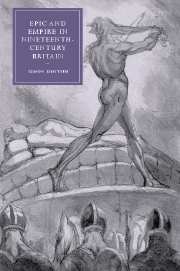Book contents
- Frontmatter
- Contents
- Acknowledgements
- Introduction
- 1 Homer, Ossian and Modernity
- 2 Walter Scott and Heroic Minstrelsy
- 3 Epic Translation and the National Ballad Metre
- 4 The Matter of Britain and the Search for a National Epic
- 5 ‘As Flat as Fleet Street’: Elizabeth Barrett Browning, Matthew Arnold and George Eliot on Epic and Modernity
- 6 Mapping Epic and Novel
- 7 Epic and the Imperial Theme
- 8 Kipling, Bard of Empire
- 9 Epic and the Subject Peoples of Empire
- 10 Coda: Some Homeric Futures
- Notes
- Bibliography
- Index
- CAMBRIDGE STUDIES IN NINETEENTH-CENTURY LITERATURE AND CULTURE
2 - Walter Scott and Heroic Minstrelsy
Published online by Cambridge University Press: 22 September 2009
- Frontmatter
- Contents
- Acknowledgements
- Introduction
- 1 Homer, Ossian and Modernity
- 2 Walter Scott and Heroic Minstrelsy
- 3 Epic Translation and the National Ballad Metre
- 4 The Matter of Britain and the Search for a National Epic
- 5 ‘As Flat as Fleet Street’: Elizabeth Barrett Browning, Matthew Arnold and George Eliot on Epic and Modernity
- 6 Mapping Epic and Novel
- 7 Epic and the Imperial Theme
- 8 Kipling, Bard of Empire
- 9 Epic and the Subject Peoples of Empire
- 10 Coda: Some Homeric Futures
- Notes
- Bibliography
- Index
- CAMBRIDGE STUDIES IN NINETEENTH-CENTURY LITERATURE AND CULTURE
Summary
‘THE NATIONAL MUSE IN ITS CRADLE’
John Sutherland makes a straightforward distinction in his biography of Walter Scott: between Scott as ‘philosophical historian’ and as antiquarian. In the first capacity, Scott is the heir of the Scottish Enlightenment, familiar with the notion of history as a series of stages progressing from the savage state through to modern commercial civilisation. Such ideas, indeed, were a central part of his education. Scott's role as an antiquarian, by contrast – ‘the hoarder of coins, suits of armour, old manuscripts and heroic relics’, in Sutherland's words – was perhaps at least as important in his formation as a writer. But it is Scott as philosophical historian that I wish to discuss in this chapter, especially as his writings carry forward an aspect of the problematic described in the Introduction – that combination of ideas that associates epic with the barbarous stage of society and hence pushes it to the margins of contemporary civility. It is above all through the figure of Walter Scott, as ballad collector and poet as much as novelist, that the connections between epic, romance, national balladry and the pre-modern world were conclusively established for the nineteenth century. This chapter will trace the nature of those connections, and the centrality of the figure of the bard, in Scott's writings about ballads and related topics, and in his poems The Lay of the Last Minstrel and The Lady of the Lake.
- Type
- Chapter
- Information
- Epic and Empire in Nineteenth-Century Britain , pp. 26 - 47Publisher: Cambridge University PressPrint publication year: 2006



